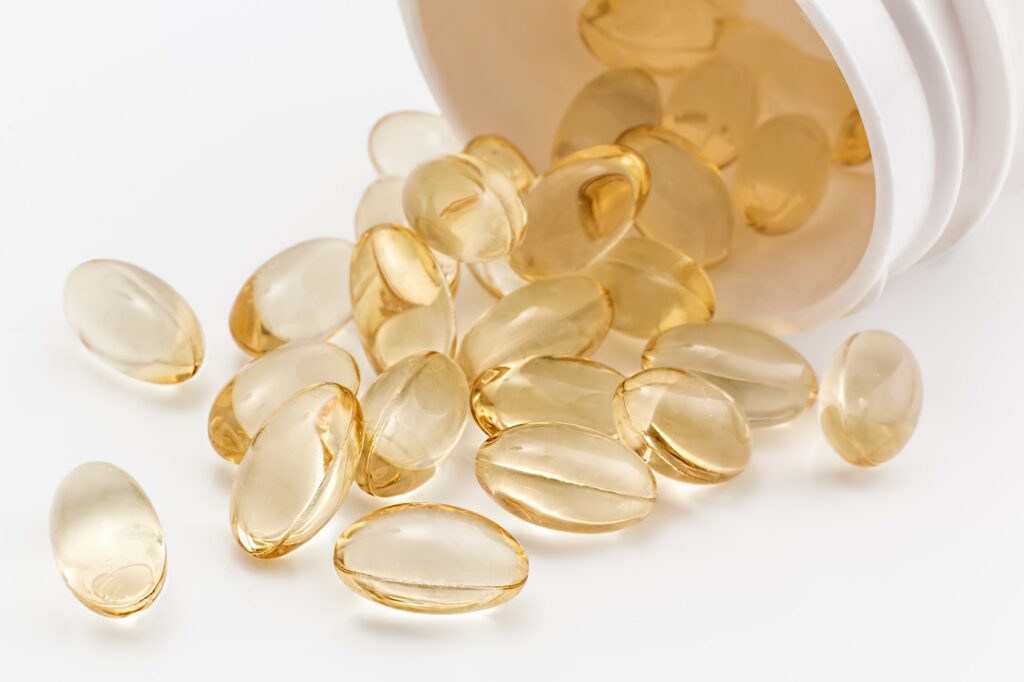As health-conscious dog parents, we all want our pups to look and feel their best because we understand that it is a reflection of their overall health. To achieve this, we always ensure that they eat the best pet foods we can afford, take them for monthly or annual veterinary appointments, and make sure they get a lot of exercise. Some of us go as far as buying over-the-counter fish oil supplements to add an extra degree of protection. But are these supplements necessary or safe for our canine friends? Well, let’s find out.
Generally, fish oil can contribute important omega-3 fatty acids that our dogs need. Derived from marine animals like mullet, salmon, tuna, sardines, mackerel, and anchovies, Omega-3 fatty acids are nutrients that dogs can’t produce on their own. They have to get them from the diets that we feed them and supplements are often used to fill in the gaps.
Fish oil supplements are rich in two important essential fatty acids: eicosapentaenoic acid (or EPA) and docosahexaenoic acid (or DHA). Both fatty acids have the potential to treat inflammation at the cellular level. They are converted into prostaglandins, which are known to reduce the tendency of your dog’s tissues to become inflamed. Less inflammation translates to less redness, pain, and swelling of the skin, joints, and other body organs.
Omega 3 also plays a critical role in balancing out the omega-6 fatty acids that are common in processed dog foods. Since many commercial dog food companies use meat sourced from corn-fed animals and refined oils, which are all high in Omega-6, our pups often end up with too much omega-6 fatty acids in their bodies—and much less omega-3 fatty acids. However, a healthy dog’s body needs both in balance, and that’s why supplementation with fish oil supplements is critical.
Can I Give My Dog Over The Counter Fish Oil?
Now that you understand why adding fish oil in your dog’s diet is important, where do you find the best option for your dog? Is over-the-counter fish oil safe for your pup?
The short answer is: over-the-counter fish oils are typically safe for dogs. However, you should be careful about the quantity (dosage) that you give to your dog. Before integrating over-the-counter fish oil in your dog’s diet, it is recommended to consult your vet to help you establish the correct dosage for your dog.
Only your vet can help you determine the best dosage based on your dog’s current dietary needs, health history, and the condition you are trying to help. Omega-3 fatty acid supplementation is not recommended for every dog. For instance, it is not advisable to give omega-3 fatty acids to dogs with bleeding disorders or gastrointestinal issues. Some pet foods also have omega-3 in them already. Working closely with your vet can, therefore, help you determine if over-the-counter fish oil is a necessary addition to your dog’s diet as well as how much you should supplement. Finally, a vet may tell you the best type of fish oil (ethyl ester oil, natural triglyceride, or synthetic triglyceride) is appropriate for your dog based on his current dietary information.
Benefits of Fish Oil for Dogs

Based on documented fish oil benefits, here are the top reasons why including over-the-counter fish oil in your dog’s diet is a worthwhile move:
- Arthritis Relief: Due to their potent anti-inflammatory properties, Omega-3 fatty acids have been proven to provide therapeutic benefits for arthritic dogs. In a past study, 127 arthritics dogs that were fed with Omega-3 fatty acids over 60 days period showed significant improvement in their ability to walk, play, and rest comfortably.
- Joint Health: Most joint conditions in dogs are associated with inflammation, which can be reduced by EPA and DHA in fish oils. Although dogs with severe joint pain may need specialized treatments, fish oil supplementation has been shown to alleviate some joint pain in dogs and humans alike.
- Treatment of Kidney diseases in dogs: Fish oil is frequently recommended for dogs with glomerular disease, a kidney condition that is associated with extreme protein loss in the urine. In a past study on dogs with secondary glomerular injuries, supplementation with fish oil was shown to slow the progression of kidney damage.
- Heart Health: Fish oil supplementation can reduce inflammation and muscle loss that are often associated with heart failure in dogs. Due to their potent anti-inflammatory properties, Omega-3 fatty acids can also help reduce abnormal heart rhythms in dogs.
- Treatment Of Cognitive Dysfunction: In a 2018 study carried on 142 dogs with a wide range of behavioral abnormalities (including disrupted sleep patterns, disorientation, loss of house training, altered activity levels, and altered interaction with family members), dogs fed on DHA-based diets showed major improvement in every one of the abnormalities. Fish oil can, therefore, help treat canine cognitive dysfunction, which is a common condition in some senior dogs.
- Healthier Weight: Fish oil may also help reduce weight loss issues in dogs. Dogs that are fed fish oil tend to maintain a healthy weight than their counterparts that don’t get enough Omega-3 fatty acids in their diets.
- Promotes Neuron Development: Omega-3 fatty acid, especially DHA, is also known to boost neuron development in dogs. So, including fish oil during the first few months of your puppy is critical for optimal development.
How many human fish oil capsules should I give my dog?

OTC fish oils have the nutrients your dog needs, but they may contain higher concentrations of EPA and DHA than what’s recommended for your dog. Therefore, the right dosage must be strictly maintained to prevent any potential health complications.
As a guide, smaller dog breeds should be fed less amounts of fish oil and vice versa. If you are planning to give your dog fish oil capsules, 1 or 2 capsules are enough for large dog breeds. However, dogs with inflammation problems or allergies may require more capsules than others.
Ideally, you should take the weight of your dog in pounds and multiply it by 20. The value obtained should be your dog’s daily dosage of EPA in milligrams. A dog that weighs 30 pounds, for instance, should be given about 600mg of EPA. It is also advisable to choose over-the-counter fish oil supplements with higher EPA concentration than DHA since they are more effective for fighting inflammation issues in dogs.
As aforementioned, if you are not sure of the right dosage of fish oil to give your dog, consult your vet. A vet should be in a better position to advise you on the proper dosage depending on your dog’s condition or dietary needs.
Oxidation Concerns
Although over-the-counter fish oil supplements are considered to be safe and beneficial to dogs, some brands are highly susceptible to oxidation. Exposure to oxygen can easily break them into smaller compounds such as malondialdehyde (MDA) and drastically reduce their anti-inflammatory properties and other health benefits. If oxidation occurs, feeding your dog these supplements becomes pointless and can even cause health issues to your dog.
However, there is a solution: past studies have shown that adding certain antioxidants like astaxanthin to the fish oil can boost its resistance to oxidation and help it maintain its potency. Dog owners, who are aware of this fact, opt for krill oil over fish oil because krill oil already contains astaxanthin.
Other OTC Fish Oil Precautions
Like any other product out there, not all over-the-counter fish oils are created equal. In this report, for instance, 21 of the best-selling fish oil products in the US were shown to contain up to 10% more or less concentrations of EPA and DHA than what their labels claimed.
Before, giving your dog over-the-counter fish oil, therefore, you should be very careful about the dosage. Too much fish oil can cause adverse side effects to your dog, including:
- Inflammatory Response: Because of its anti-inflammatory properties, fish oil can interfere with certain processes in your dog that may need inflammatory responses like the healing of wounds and combating allergies.
- Blood Clotting Abnormalities: Excess fish oil can interfere with platelet functions, which aid blood clotting.
- Gastrointestinal Issues: Feeding your dog large quantities of fish oil may cause diarrhea, vomiting, and abdominal pain in dogs.
- Oily coat and skin: Fish oil can also cause overproduction of oil in your pooch’s body, resulting in oily coat and flaky skin.
- Fish oil may also interact with other medications like non-steroidal anti-inflammatory medications, producing health issues for your dog.
Which Fish Oil Supplements Are Good For My Dog?
If you want to try over-the-counter fish oil supplements for dogs, give the following 5 options serious consideration. All of them come with the most important features you’d want in a good supplement.
1.Zesty Paws Pure Alaskan Salmon Oil for Dogs
Rich in natural EPA and DHA (sourced from wild-caught Alaskan Salmon), this is the fish oil you need if you want to help your pooch maintain healthy skin and coat as well as his overall health. You can add it to any meal and it is a great alternative to omega-3 capsules, raw treats or soft chews. For convenience, it comes in a handy pump bottle to make it easy for you to squirt it into your dog’s food.
2. TerraMax Pro Liquid Omega-3 Fish Oil for Dogs
Boasting of 800mg EPA and about 525 mg DHA, this is of the most potent fish oil that you’ll find on the market today. If your dog is already suffering from inflammation or skin and coat problems, this is the fish oil that you should get him. Like the first entry in our list, it is made from wild-caught fish, so you can rest easy that your dog will be getting natural sources of EPA and DHA. It is also molecularly distilled to eliminate PCBs, heavy metals, and other toxins that may be harmful to your dog.
3. Grizzly Wild-Caught Salmon Oil Dog Food Supplement
This is another fish oil product that has been extracted from wild-caught salmon to provide natural Omega-3 fatty acids. It also packs the necessary dog vitamins that you pooch needs and has been tested by Us-based third-party quality testing labs. It is also liquefied, which implies that you can easily add it to your dog’s food by pumping it out of the bottle.
4. Nordic Naturals Omega 3 Liquid Fish Oil For Small Dogs
Specially formulated for small dogs, this Nordic Naturals fish oil comes in true triglyceride form to allow optimum absorption and results. Made from wild-caught anchovies and sardines, this fish oil is all you need for healthy skin and coat, improved immune system, heart health, and superb brain and development in your small breed. Like other Nordic products, this particular fish oil has been tested by third-party quality labs to ensure purity and freshness.
5. Nordic Naturals Omega-3 Fish Oil Capsules
If you prefer giving your pup capsules instead of having to mix liquids with his food, this is the best fish oil option for you. It comes in true triglyceride form for fast optimal absorption and is recommended for dogs of all sizes. Like all the fish oil options that we have included in this list, these Nordic Naturals soft gels are made from wild-caught fish sourced from cleanest waters to ensure that your dog gets natural sources of Omega-3 fatty acids.
Final Thoughts
Adding over-the-counter fish oil to your dog’s diet can help your pup maintain his joint health and flexibility, shiny and soft coat, healthy weight, and boost his cognitive functions. However, if your dog is already getting omega-3 fatty acids from his store-bought or homemade foods, excess fish oil may harm him. So, always consult your vet to be certain of the amount of fish oil to give your dog or the type of over-the-counter fish oil that is appropriate for your dog. Finally, always remember that if your dog has serious inflammatory or other health conditions, fish oil supplementation will not be able to treat the condition by itself—it will only enhance the effects of the medications prescribed to treat the condition.
As an Amazon Associate, we may receive a small commission from qualifying purchases but at no extra cost to you. Learn more. Amazon and the Amazon logo are trademarks of Amazon.com, Inc, or its affiliates.






